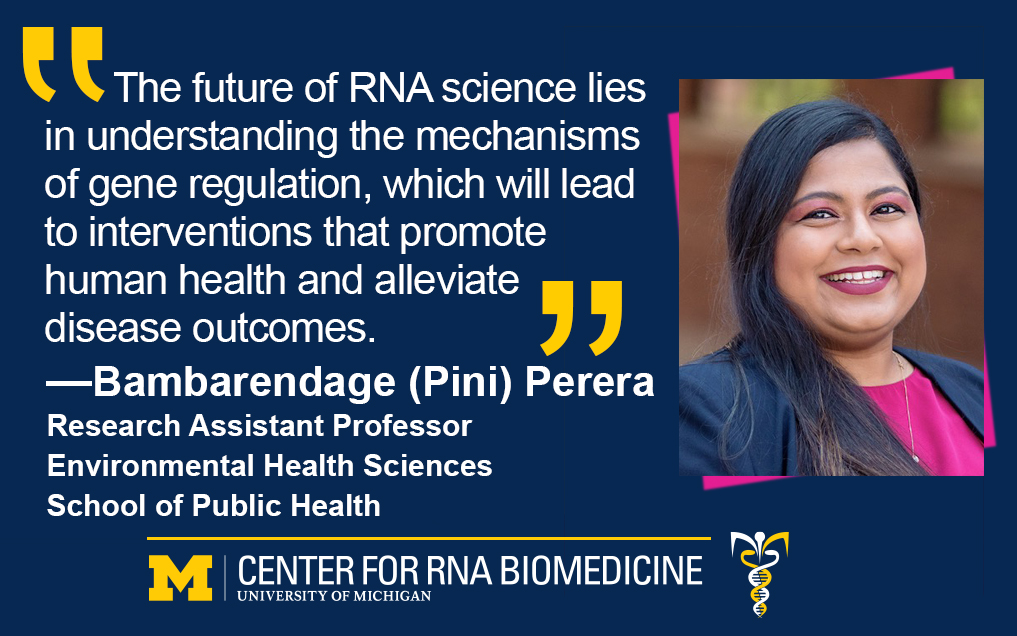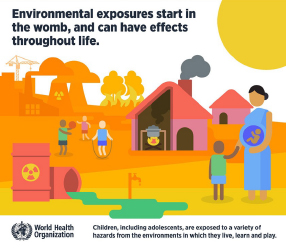Bambarendage Pinithi (Pini) Perera
 Bambarendage Pinithi (Pini) Perera
Bambarendage Pinithi (Pini) Perera
Research Assistant Professor
Environmental Health Sciences
School of Public Health
My primary research interests are in the field of environmental epigenetics, which seeks to identify molecular mechanisms and changes in epigenetic cues that result from environmental exposures at critical times in life, and links of these phenomena to their influences on human health and disease.
What is the role of RNA in your research?
The concept of epigenetics sheds light on this debate by explaining how environmental factors such as diet and toxicants influence gene expression of biological processes without altering the DNA sequence. DNA methylation at cytosine residues, histone modifications, and non-coding RNA (ncRNA) constitute the reversible epigenetic modifications that regulate gene expression. I am particularly interested in studying small ncRNA (such as piwi-interacting RNA, or piRNA) as potential tools for epigenome editing and as potential biomarkers for environmental exposures.
Is there a layman image/metaphor to explain your research?
If DNA is a cell’s hardware, the epigenome is its corresponding software, and ncRNA regulation of gene expression is among one of the software programs important for cellular functions. I aim to understand how these software programs could potentially be modified to dictate cellular processes.
Who/what brought you to science?
As a child, I was raised as an independent thinker who was genuinely curious about nature. When learning the central dogma of molecular biology in high school, I questioned how the environment impacted gene regulation. I believe that my continuous curiosity and a wonderful group of teachers, friends, and mentors have constantly kept me interested and engaged in science.
What brought you to the University of Michigan?
I joined the University of Michigan as a postdoctoral fellow and recently transitioned to a faculty position. I initially joined UM based on recommendations from my thesis committee and how my research interests aligned with that of my postdoc mentor. However, my decision to continue to stay at Michigan is due to its highly collaborative environment and resources.
What advice would you give to students who’d like to get more involved in research?
I would advise students to embrace and feed their curiosity of science, and not to hesitate to approach potential mentors conducting research that interests them. It never hurts to ask!
Are there any opportunities for students to engage in your projects, currently or in the future?
Yes
What skills would they need?
They would need a background in basic biology. Prior laboratory experience working with animals and/or lab techniques is beneficial.
What could they expect to learn?
We encourage the students in our group to foster interdisciplinary scientific questions/ideas and provide a highly collaborative environment to address them.
What profession other than your own would you enjoy, or what is your favorite hobby?
At 12 years old, I was inspired to become a geneticist by Dana Scully, a character from the television series “The X-Files,” who was an FBI agent, medical doctor, and geneticist. So, I probably would have enjoyed a job as a detective or an FBI agent.
Apart from science, my favorite hobbies include cooking, learning different languages and cultures, exercise, and traveling.
Read about Pini Perera’s scientific journey

